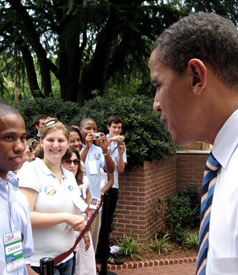Did you know that Truthout is a nonprofit and independently funded by readers like you? If you value what we do, please support our work with a donation.
If the Democrats don’t get the youth vote, they’re toast. That happened in Virginia, New Jersey and Massachusetts, where young Obama voters stayed home in droves. It’s an ugly, conceivable future portended by a new Harvard poll that shows 41 percent of young Republicans planning on voting in November, compared to 35 percent of young Democrats and 13 percent of independents. A recent Pew poll showed a similarly disturbing pattern: Young voters still prefer the Democrats, but their margin is slipping and their enthusiasm level is worse.
Some Reasons and Some Solutions
The Democrats need to tackle youth joblessness. They’ve passed important changes in student financial aid, like income-contingent loan repayment. Most students and recent students don’t know about them, and they need to. But with youth unemployment at near-record levels, it’s understandable that young men and women would feel angry and frustrated. If the Democrats want to keep this generation, they need to pass major jobs bills, probably through reconciliation, since the Republicans seem to be only too eager to leave young voters demoralized and unemployed. It would be nice if the Obama administration were leading on this more strongly, but since they aren’t leading strongly enough, the push to make jobs the top priority has to come from the grassroots. This happened in the 1930s under Roosevelt. Seventy-five years later, I can visit a Works Progress Administration-created library or go for a run on a Works Progress Administration-created boardwalk, and reap the benefits of programs that also gave millions of people desperately needed jobs. We need to make equivalent investments now, targeted at those who need jobs the most. It also wouldn’t hurt to address the drastic lack of health insurance among all but the most affluent youth, and to avoid a further Afghan quagmire.
But we need more than specific programs and policies. We need to give people a renewed sense of why involvement matters. Absent a sense of how social change has occurred in the past and can again, it’s tempting to give up when you’ve barely begun, all the more in an instant-attention and instant-gratification culture. Given that few of us know the stories of how previous citizen activists persisted and prevailed, it’s understandable that many who were acting so passionately just over a year ago feel adrift and unable to make an impact. That’s true of more experienced activists, but it’s particularly true of those for whom the Obama campaign was first step into trying to create a more humane common future. Those of us who’ve been involved longer (including veteran youth activists) need to offer this perspective, to help those more recently involved avoid cynical resignation and withdrawal.
We need these lapsed activists and particularly lapsed youth activists, because they’re the ones who will reach out to their peers. During the 2008 election, you could go anywhere in battleground states and find efforts to engage young voters. In the Virginia, New Jersey and Massachusetts elections, the campaigns largely ignored them, and the parallel independent efforts that might have filled the gap didn’t exist. Without being reached by these more personal approaches, young voters were left more isolated, more readily manipulated by 30-second ads, and more likely to simply stay home. As I explore in my “Soul of a Citizen” book, change works best when people approach those they already know, within familiar contexts. And when campaigns, movements and their supporters reach out in ways that offer a chance for genuine dialog. Some of this can be through social media – we need the texting, Facebooking, and other networking that helped the Obama campaign bloom. But these approaches work best when complemented by more visible public actions and more direct personal dialog. If we’re going to enlist those who once acted and speak to their legitimate discontents, we’re going to need to recreate this one-on-one reach, and begin to recreate it now, not just in the last two weeks of the campaigns.
As the recent surveys imply, the stakes in this are huge – not just for now or November, but for the ongoing allegiance and participation levels of a generation. Whether citizen activists can help the Obama administration and the Democrats re-engage those who carried them to victory in ’08 will shape American politics not just in the coming year, but for decades to come. The Obama administration can play a critical role in demanding action on issues that affect young voters’ lives. The Congress can use all available options, including reconciliation, to pass them. But it’s up to the rest of us to offer the examples of connection, context and continued commitment.
Media that fights fascism
Truthout is funded almost entirely by readers — that’s why we can speak truth to power and cut against the mainstream narrative. But independent journalists at Truthout face mounting political repression under Trump.
We rely on your support to survive McCarthyist censorship. Please make a tax-deductible one-time or monthly donation.
